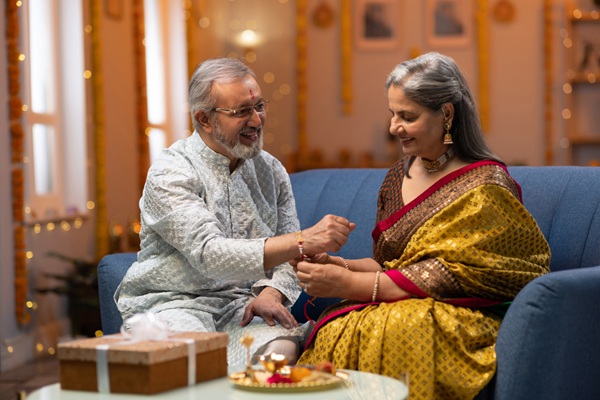.png)
A Thread That Holds More Than it Ties
In a world of staged celebrations, a quiet Raksha Bandhan visit shows how the simplest gestures can carry the deepest bonds.

Kalyani Srinath, a food curator at www.sizzlingtastebuds.com, is a curious learner and a keen observer of life.
August 16, 2025 at 8:24 AM IST
Festivals in India have always been more than dates on the calendar. They are pauses in the year, moments when time seems to move a little slower, doors stay open longer, and conversations stretch over cups of chai. Raksha Bandhan is one such pause, a day sewn together by small rituals, familiar laughter, and age-old promises wrapped in a simple thread.
And yet, in recent years, the pace has quickened. Somewhere between matching outfits, arranging Instagram-perfect thalis, and ensuring the sweets look as good as they taste, the festival has picked up a layer of performance. It’s still joyful, but the joy sometimes gets dressed up before it’s felt.
Every now and then, though, life offers a scene that gently reminds us what these celebrations truly mean.
It was two days after a huge family reunion. The home still carried the echoes of music, the scent of marigolds, and the pleasant fatigue of endless greetings. In the middle of this post event haze, the doorbell rang.
Standing outside was an elderly gentleman, 85 years old bent over slightly with age than wisdom, dressed in pristine white, holding a modest box of mithai.
He hadn’t come for wedding news or to gossip, but for something much older in meaning — to have a Rakhi tied by the lady of the house.
The Rakhi was simple — red and gold thread, quietly beautiful in its humility. There were no cameras poised to capture the knot, no carefully arranged background.
Just a steady hand tying it, a murmured blessing, and the gentle clink of two cups as tea was poured. They spoke for a short while, of health, of family, of those who were no longer here, and then he left. It was a visit that lasted minutes, but it carried the weight of decades.
Strength of Presence
There is something deeply grounding in how the older generation approaches festivals. Rituals are not obligations to complete, but bridges that are crossed, year after year, without fail. For them, the significance of the day is not in how it looks, but in the very fact that it happens, the keeping of a promise, the remembering of a bond.
Presence is their gift. Not the hurried, multitasking kind, but the kind that fills a room quietly and completely. That visit from the old gentleman was just that, an act of showing up, without expectation, without embellishment.
In today's fast-flowing life, moments like these can feel rare. Workdays blend into weekends, messages replace meetings, and “I’ll call you soon” becomes an automatic response. Festivals are meant to interrupt that blur, to remind us to step out of the stream for a day and stand still with those who matter.
The beauty of that afternoon lay in its simplicity. The Rakhi was tied not as a custom to be checked off, but as an affirmation. The blessing given was not a polite closure to a conversation, but a heartfelt wish, the kind that carries the weight of sincerity.
It is easy to forget that blessings, like relationships, gain value over time. They may not glitter, but they endure.
Not all bonds can be explained. Siblings by birth, siblings by choice, relations kept alive over lifetimes — these are connections invisible to anyone outside them and yet strong enough to anchor lives. Festivals like Raksha Bandhan are not about starting those bonds, but about keeping them woven tightly even when life pulls at the edges.
The elder’s visit wasn’t grand or elaborate, but it was deliberate — a small ritual upheld, a promise kept. That is what makes such gestures unforgettable.
Lightness in Tradition
Festivals are not solemn days; they’re meant to be joyful. To gather, to eat together, to tease each other over old stories, to laugh until the tea goes cold. The beauty is in how this lightness sits alongside meaning — the way a blessing can be heartfelt and a joke can follow right after.
That afternoon was like that. A thread tied, a few warm words, a story shared, a laugh over nothing in particular. No one remembered to take a photograph, but everyone remembered how it felt.
There’s no need to abandon the things that make modern celebrations colourful — the photographs, the outfits, the treats. But somewhere alongside them, there’s room for the quieter parts too: the unposed moments, the blessings exchanged without an audience, the cups of tea that taste better because of who you’re having them with.
Sometimes the most memorable parts of a festival aren’t the ones we plan, they’re the ones that slip in naturally, unhindered by schedules or aesthetics.
Years from now, it may not be the design of the Rakhi or the brand of the sweets that comes to mind. It will be the sound of that knock on the door. The sight of an elder walking in with a small box in hand. The feeling that some bonds, however quietly they exist, are held with great care.
That is the soul of Raksha Bandhan — that in the middle of our moving, busy lives, we keep one thread untangled, one ritual unbroken. And in that thread lies an entire story: of presence, of affection, of the joy that comes from simply being together.



